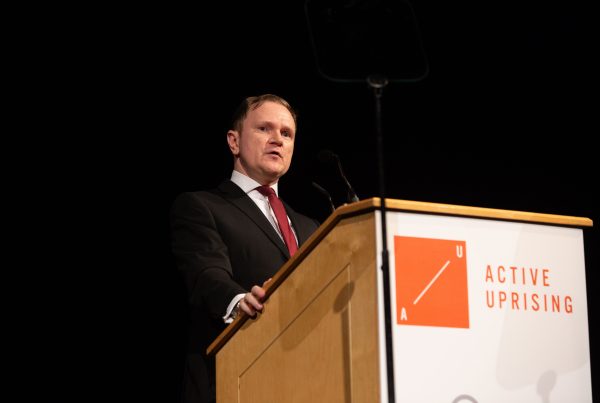By Professor Greg Whyte, Chair of the ukactive Scientific Advisory Board and Professor of Applied Sport and Exercise Science at Liverpool John Moore’s University
In an earlier blog, I outlined the important role exercise plays in health. Of note, and in light of the recent attention COVID-19 has shone on the importance of immune function, it is generally accepted that exercise (associated with World Health Organisation guidelines) is beneficial for immune function8. This important link between exercise and health was reiterated by Professor Chris Whitty (UK Chief Medical Officer) at the recent ukactive National Summit, where he stated: “There is no point in life where doing more exercise does not improve health in multiple ways.”
The well-documented link between age and severity of disease in COVID-19 is, in part, linked to the age-related decline in immune function, commonly termed ‘immunosenescence’. This immunosenescence is also linked to a dampened response to vaccination with ageing10. Exercise may exert an anti-immunosenescence effect, perhaps delaying the onset of immunological ageing or even rejuvenating aged immune profiles8. In addition, acute bouts of exercise have been shown to improve or ‘stimulate’ aspects of immune function that decline with age9.
A number of studies have suggested an important role for exercise in enhancing the immune response to vaccination5. Chronic exercise or high levels of physical activity (lifelong activity) have been shown to be related to improved vaccine response in older adults and elite athletes alike, illustrating improved immune function and, the former, conferring potentially significant public health benefit1,3.
Given the negative impact of chronic psychological stress on the immune response to vaccination, it may be the mental and emotional health benefits of exercise that, in part, support the improved response to vaccination10. This improvement in vaccine response may also be of value to those that are immunocompromised, or those with a higher risk of infection1.
A small number of studies have reported an improved vaccine response to acute exercise, ie exercise immediately prior to the delivery of a vaccine. While the research supporting the role of acute exercise as an adjuvant to vaccination is encouraging, the majority of this work has examined young, healthy participants. Further research is required to establish the impact of acute exercise on vaccine response in older and ‘at risk’ populations. Furthermore, the type (aerobic versus resistance), duration and intensity of exercise required to optimise the immune response remains unclear and warrants further investigation.
Of note, not all studies have reported an enhanced immune response following an acute exercise bout prior to vaccination, however, exercise prior to vaccination does not appear to be harmful or detrimental to the immune response2, a result supported in recent study examining elite athletes which reported no difference in immune response following vaccination, whether a high intensity training session had been completed two hours or 24 hours prior to vaccination7. Interestingly, a small number of studies have suggested a reduction in local and systemic adverse reactions to vaccination in response to exercise4.
While further research is required to confirm the role of acute exercise in the positive immune response to vaccination, it is clear that regular exercise is linked to enhanced immune function across the life-span which enhances the immune response to vaccination. Accordingly, the role of exercise in enhancing vaccine response consolidates the promotion of physical activity for population health, and the fitness and leisure sector as an essential service.
References
- Edwards, M. and Booy, R. Effects of Exercise on Vaccine-Induced Immune Responses. Human Vaccines & Immunotherapeutics 2013;9(4):907-910.
- Grande, AJ. et al. Exercise Prior to Influenza Vaccination for Limiting Influenza Incidence and its Related Complications in Adults. Cochrane Database Syst Rev 2016;22(8):CD011857.
- Ledo, A. et al. Elite Athletes on Regular Training Show More Pronounced Induction of Vaccine-Specific T-Cells and Antibodies after Tetravalent Influenza Vaccination than Controls. Brain Behav Immun 2020;83:135-145.
- Lee, V.Y. et al. The Effect of Exercise on Local and Systemic Adverse Reactions After Vaccinations – Outcome of Two Randomised Controlled Trials. Vaccine 2018;36(46):6995-7002.
- Simpson, R. & Katsanis, E. The immunological Case for Staying Active During the COVID-19 Pandemic. Brain Behav Immun 2020;87:6-7.
- Simpson, R. et al. High-Intensity Exercise Ilicits the Mobilization of Senescent T Lymphocytes into the Peripheral Blood Compartment in Human Subjects. J Apply Physiol 2007;103(1):396-401.
- Stenger, T. et al. Timing of Vaccination after Training: Immune Response and Side Effects in Athletes. Med Sci Sports Ex 2020;52(7):1603-1609.
- Turner, J. Is Immunosenescence Influenced by our Lifetime ‘Dose’ of Exercise? Biogerontology 2016;17:581-602.
- Walsh, N. et al. Position Statement. Part one: immune function and exercise. Exerc Immunol Rev 2011;17:64-103.
- Zimmerman, P. et al. Factors that Influence the Immune Response to Vaccination. Clin Microbiol Rev 2019;32(2)

More People More Active More Often




